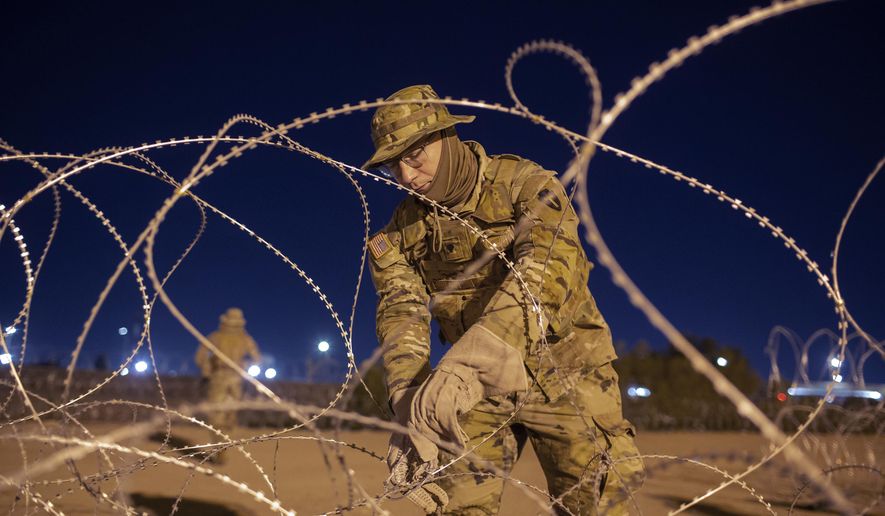The Supreme Court on Monday issued an order allowing federal Border Patrol agents to cut through Texas’s razor-wire border fence, delivering a win to President Biden’s border policies.
The case is an early test in a series of ongoing legal clashes between Mr. Biden and Gov. Greg Abbott, who has sought to plug what he calls gaps the federal government has left in border security thanks to the current administration’s more relaxed approach to illegal immigration.
Part of that is Texas’ placement of miles of razor wire along the banks of the Rio Grande in an effort to try to discourage migrants from wading across.
Mr. Biden and his team argued that Texas was preventing the federal government from handling the border how it wanted, which includes monitoring, rescuing and catching and releasing the immigrants breaching the border illegally.
A lower court had sided with Texas and issued an injunction ordering federal agents not to cut the wire save for life-saving emergencies. But the Supreme Court, in a 5-4 decision, deleted the lower court’s injunction.
Chief Justice John G. Roberts Jr. and Justices Sonia Sotomayor, Elena Kagan, Amy Coney Barrett and Ketanji Brown Jackson sided with the president.
Monday’s ruling was on a preliminary injunction. The case now goes back to a federal appeals court for more consideration, but Homeland Security can slash through the fence while the case is pending.
Texas Attorney General Ken Paxton slammed the ruling as an impediment to border security, saying that allowing Mr. Biden a free hand to continue his policies “will not help enforce the law or keep American citizens safe.”
“This fight is not over, and I look forward to defending our state’s sovereignty,” he said.
House Speaker Mike Johnson, Louisiana Republican, said in battling Texas, Mr. Biden is siding with “traffickers and cartels.”
“Gov. Abbott is doing exactly what any leader must: Taking action to protect his state’s sovereignty and his citizens’ security,” he said. “Rather than providing federal help, the President is shamefully undermining these efforts. It is an outrage.”
Texas and the administration also are battling over the state’s 1,000-foot floating wall along one part of the Rio Grande, Texas’ new law creating a state penalty for illegally entering the country, and a recent move by Texas National Guard troops to block off Border Patrol access to Shelby Park, a spot in Eagle Pass that migrants have used as an entry point to the U.S.
The situation grew tense this month when Mexico reported that it had recovered bodies of a woman and two children who drowned in the Rio Grande near the park and were trying to respond to two other migrants in distress.
Border Patrol agents said they tried to gain access to the park to assess the situation but the National Guard troops refused to let them in.
Mexico later reported it rescued the two migrants who had to turn back from their attempt, as well as rescuing two other migrants who had gotten into trouble during a night crossing.
The agents who tried to gain access to the park said it was an emergency situation, according to the federal government. Texas disputes that, saying the agents talked about the drownings but never said anything about migrants actively in distress.
For that matter, Texas suggested, the Border Patrol wasn’t in a position to mount a rescue operation at that time.
The case has inflamed both sides of the illegal immigration debate, with immigration activists saying Texas is showing a disregard for life and border security advocates saying the state is trying to disrupt the incentives the Biden administration has created for people to come illegally.
A district court had ruled with the Biden administration, arguing the federal government enjoyed sovereign immunity against Texas’ demand for an injunction stopping the wire-cutting. But that judge also slammed the administration for being “derelict” in enforcing immigration laws.
The 5th U.S. Circuit Court of Appeals reversed the decision and issued the injunction, ruling that the Biden administration did not have immunity from a lawsuit.
• Stephen Dinan can be reached at sdinan@washingtontimes.com.




Please read our comment policy before commenting.